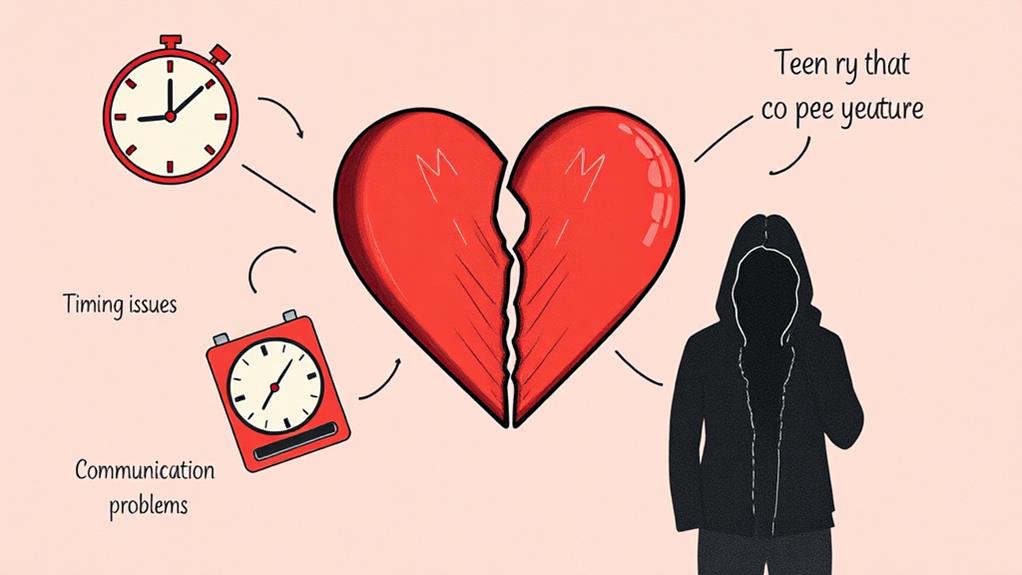When you experience a breakup as a teenager, it can feel overwhelming, leaving you to wonder what went wrong and how to cope. Understanding the common reasons behind these splits, like communication issues and differing values, is crucial for your emotional well-being. As you navigate this challenging phase, it's important to explore ways to heal and grow from the experience. But what steps can you take to ensure you emerge stronger on the other side?
Common Reasons for Breakups

Breakups are often driven by a handful of common reasons that many teens experience. One major reason is communication issues. If you and your partner struggle to express your feelings or listen to each other, misunderstandings can arise, leading to frustration.
Another common reason is growing apart. As you both develop your interests and identities, you might find that your paths no longer align, making it tough to stay connected.
Trust issues can also play a significant role in breakups. If you or your partner feel insecure or jealous, it can create tension that's hard to overcome.
Differences in values and goals can lead to a breakup too. For example, if one of you wants to focus on school while the other is more interested in hanging out, it might cause conflict.
Emotional Impact of Breakups
The emotional impact of a breakup can be overwhelming, often leaving you feeling a mix of sadness, confusion, and even anger. You might find yourself questioning what went wrong or replaying memories in your mind, which can make moving on even harder. It's completely normal to feel lost during this time, especially if the relationship was significant to you.
You may experience a rollercoaster of emotions, from deep sorrow to moments of relief. Sometimes, you might even feel guilty or think you could've done something differently. It's essential to remember that these feelings are a normal part of healing. Allowing yourself to feel and express these emotions can help you process the situation better.
Talking to friends or family can also be beneficial. They can offer support and help you see things from a different perspective. Engaging in activities you enjoy or trying something new can lift your spirits and distract you from the sadness.
Although it might feel like the end of the world right now, remember that you'll heal with time, and brighter days are ahead. Give yourself permission to grieve, and don't hesitate to seek help if you need it.
Signs of a Healthy Relationship

A healthy relationship shines through in the way both partners communicate and support each other.
You'll know you're in a good place when you can openly share your feelings without fear of judgment. Effective communication means you listen as much as you talk, and you respect each other's opinions, even when you disagree.
Trust is another key sign of health. If you feel safe sharing secrets or being vulnerable, that's a great indicator that your relationship is solid.
Partners should also celebrate each other's successes, whether big or small, and encourage one another to pursue their passions.
Additionally, you should feel comfortable being yourself. If you're pretending to be someone you're not, it's time to reevaluate. Healthy relationships promote individuality while still fostering a strong bond.
Lastly, consider how you resolve conflicts. In a healthy relationship, both partners work together to find solutions, rather than resorting to blame or anger.
It's about growing together, not tearing each other down. If you recognize these signs, you're likely experiencing a healthy relationship that can withstand the tests of time.
Coping Strategies for Teens
Navigating the emotional fallout after a breakup can feel overwhelming, but having effective coping strategies can make a big difference.
First, allow yourself to feel sad. It's completely normal to grieve the loss of a relationship, so don't hold back those emotions. Writing in a journal can help you process your thoughts and feelings, giving you a safe place to express yourself.
Next, stay active. Engaging in physical activities like sports, dancing, or even just walking can boost your mood and help clear your mind. Surround yourself with friends who uplift you; their support can remind you that you're not alone.
Try to explore new hobbies or interests. Learning something new can be a great distraction and may even lead to discovering hidden talents.
Limit your social media use, especially if seeing posts about your ex is too painful. Instead, focus on positive influences in your life.
Lastly, practice self-care. Whether it's reading a book, watching your favorite shows, or treating yourself to a fun outing, pampering yourself can help you feel better.
Importance of Support Systems

While dealing with a breakup, having a strong support system can significantly ease the emotional burden. Friends and family play a crucial role in helping you process your feelings. They offer a listening ear, empathy, and sometimes a much-needed distraction from heartache. When you share your experiences with someone who cares, it can help you feel less isolated and more understood.
It's important to lean on those who truly support you. Whether it's your best friend who knows all the inside jokes or a parent who gives great advice, these connections can provide comfort during tough times. They can help you gain perspective, reminding you that this moment is just a chapter in your life story.
Don't hesitate to reach out when you need to talk or even just hang out. Engaging in activities with your support system, like watching movies or going for a walk, can lift your spirits.
Moving On After a Breakup
Moving on after a breakup can feel like climbing a steep mountain, but it's a journey worth taking. It's normal to feel sad, confused, or even angry after a relationship ends. Acknowledge those feelings; they're part of healing. Allow yourself to grieve, but don't let those emotions define you.
Start by focusing on self-care. Engage in activities that make you happy, whether it's hanging out with friends, picking up a new hobby, or diving into a favorite book. Staying active can boost your mood and distract you from negative thoughts.
Surround yourself with supportive people who lift you up and remind you of your worth.
It's also essential to set boundaries with your ex. If you need space, take it. Unfollowing them on social media can help reduce temptation and prevent you from dwelling on the past.
Learning From Relationship Experiences

After you've taken the time to heal, it's important to reflect on your relationship experiences. This reflection helps you understand what worked, what didn't, and how you can grow as a person. Start by asking yourself questions like, "What did I enjoy about this relationship?" or "What were the challenges I faced?" These inquiries can reveal patterns in your feelings and behaviors.
Consider writing down your thoughts in a journal. This practice can clarify your emotions and provide insight into your relationship dynamics. You might discover that you prefer certain qualities in a partner or that you need to work on communication skills.
It's also helpful to talk to friends or family about your experiences. They can offer valuable perspectives you mightn't have considered. Remember, every relationship, whether it ended well or poorly, teaches you something. Embrace these lessons as opportunities to become a better partner in the future.
Lastly, keep in mind that self-growth is a journey. Be patient with yourself as you navigate through your feelings and learn from what's happened. Each experience shapes you, helping you build stronger connections down the line.
When to Seek Professional Help
Recognizing when to seek professional help can be a vital step in navigating the emotional aftermath of a breakup. If you find yourself feeling overwhelmed by sadness, anxiety, or anger that doesn't seem to fade, it might be time to talk to someone.
Sometimes, these feelings can linger longer than expected, making it hard to enjoy daily activities or focus on school.
When your emotions start interfering with your everyday life, consider reaching out for support. This could mean talking to a school counselor, a trusted teacher, or a mental health professional. They can help you process your feelings and offer strategies to cope with the pain.
If you're experiencing thoughts of self-harm or feeling hopeless, don't hesitate to ask for help immediately. You're not alone, and many people care about your well-being.

